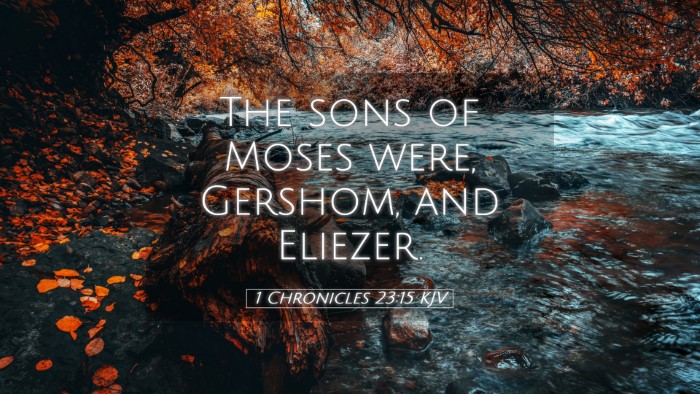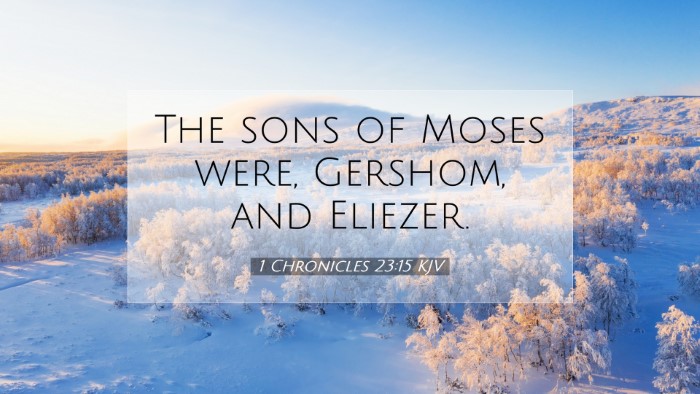Commentary on 1 Chronicles 23:15
Verse: "The sons of Moses were Gershom and Eliezer." - (1 Chronicles 23:15, NKJV)
Introduction
This verse, though brief, holds significant weight within the historical context of Israel's worship and the roles assigned to the Levites. The mention of Moses and his sons reinforces the ongoing legacy of leadership and service unto God.
Historical Context
The genealogies presented in 1 Chronicles serve to document the Levitical lineage, emphasizing the divinely ordained roles of worshippers, priests, and leaders in the Temple services. The narrative points back to Moses, establishing a historical connection to the Levites, crucial in the Israelite tradition.
Analysis of the Text
Focusing on the sons of Moses, Gershom and Eliezer, we gain insight into their significance:
- Gershom: His name means "a stranger there," indicative of the transient nature of the Israelites in their early history. Gershom represents the connection to the sojourning aspect of the Israelites' experience.
- Eliezer: Meaning "God is my help," this name reflects reliance on divine assistance, a theme prevalent throughout Israel's history.
Theological Significance
The mention of Moses' sons in this genealogical context highlights the seriousness of lineage in the service of God. In the Scriptures, lineage often carries with it the weight of spiritual authority, responsibility, and the passing down of God's promises.
Insights from Public Domain Commentaries
Matthew Henry's Commentary
Matthew Henry emphasizes the importance of families serving God, as this verse showcases the initiating involvement of Moses’ lineage in worship. He notes that those in ministry and service have a sacred obligation not only to their calling but to maintain the integrity of their families before God.
Albert Barnes' Notes on the Bible
Barnes draws attention to the dual nature of the role of the Levites. He notes that the lineage of Moses introduces an exceptional character into the Levitical priesthood, illustrating the divine selection of families tasked with critical spiritual functions. The verse acts as a reminder of both heritage and responsibility in serving God’s people.
Adam Clarke's Commentary
Clarke provides a thorough analysis of the names themselves, exploring the implications of being named after one's experiences or the circumstances surrounding one's birth. He posits that each name encapsulates a lesson for future generations of faith and reliance on God.
Practical Applications
For pastors and theologians, this verse invites deeper reflection on the connections between family, heritage, and divine service. Here are some applications:
- Understanding Spiritual Heritage: Recognizing the influence of family lines in spiritual leadership encourages current leaders to invest in the next generation.
- Emphasizing Reliance on God: Just as Eliezer's name signifies divine help, believers today must acknowledge and teach reliance on God's provision.
- Promoting Worship Roles: Leaders must ensure that the roles assigned, be they in ministry or church functions, reflect spiritual integrity and commitment to God’s service.
Conclusion
While 1 Chronicles 23:15 may appear as a simple historical note, it encapsulates profound truths regarding lineage, legacy, and the divine calling of individuals. As we seek to uphold the integrity of our spiritual service, we should remember the lessons embedded in these names and the lives of those who have gone before us in faith.


